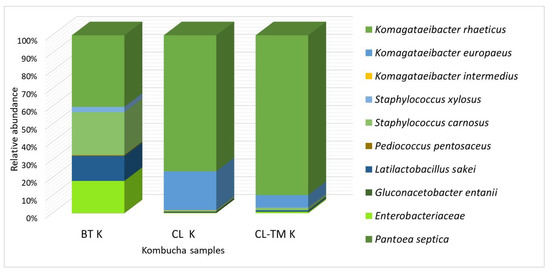
Foods, Vol. 13, Pages 484: Volatilome, Microbial, and Sensory Profiles of Coffee Leaf and Coffee Leaf-Toasted Maté Kombuchas
Foods doi: 10.3390/foods13030484
Authors: Amanda Luísa Sales Sara C. Cunha Isabel M.P.L.V.O. Ferreira Jéssika Morgado Lauro Melo Juliana DePaula Marco Antonio L. Miguel Adriana Farah
Kombucha is a fermented beverage traditionally made from the leaves of Camelia sinensis. The market has drastically expanded recently, and the beverage has become more elaborated with new, healthy food materials and flavors. Pruning and harvesting during coffee production may generate tons of coffee leaves that are discarded although they contain substantial amounts of bioactive compounds, including those found in maté tea and coffee seeds. This study characterized the changes in volatilome, microbial, and sensory profiles of pure and blended arabica coffee leaf tea kombuchas between 3–9 days of fermentation. Acceptance was also evaluated by consumers from Rio de Janeiro (n = 103). Kombuchas (K) were prepared using black tea kombucha starter (BTKS) (10%), sucrose (10%), a symbiotic culture of Bacteria and Yeasts (SCOBY) (2.5%), and a pure coffee leaf infusion (CL) or a 50:50 blend with toasted maté infusion (CL-TM) at 2.5%. The RATA test was chosen for sensory profile characterization. One hundred volatile organic compounds were identified when all infusions and kombucha samples were considered. The potential impact compounds identified in CL K and CL-TM K were: methyl salicylate, benzaldehyde, hexanal, nonanal, pentadecanal, phenylethyl-alcohol, cedrol, 3,5-octadien-2-one, β-damascenone, α-ionone, β-ionone, acetic acid, caproic acid, octanoic acid, nonanoic acid, decanoic acid, isovaleric acid, linalool, (S)-dihydroactinidiolide, isoamyl alcohol, ethyl hexanoate, and geranyl acetone. Aroma and flavor descriptors with higher intensities in CL K included fruity, peach, sweet, and herbal, while CL-TM K included additional toasted mate notes. The highest mean acceptance score was given to CL-TM K and CL K on day 3 (6.6 and 6.4, respectively, on a nine-point scale). Arabica coffee leaf can be a co-product with similar fingerprinting to maté and black tea, which can be explored for the elaboration of potentially healthy fermented beverages in food industries.
